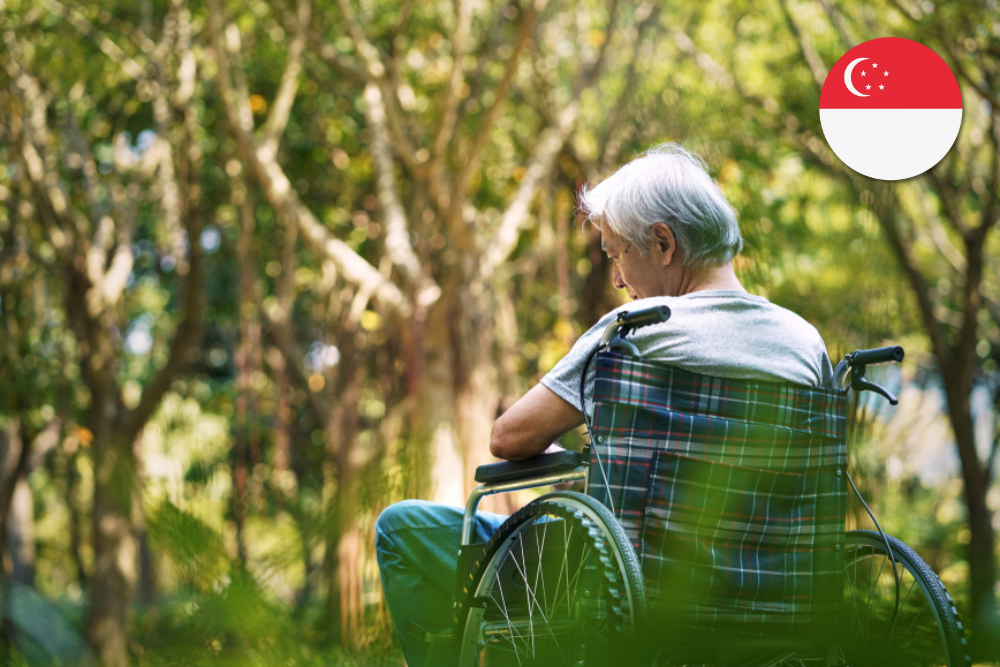Alarming Increase in Elderly People Dying Alone in Singapore
Singapore is witnessing a rising trend of elderly people dying alone in their homes, with many bodies discovered only after they start to decompose. Reports from CNA revealed at least 37 cases of lonely deaths in 2023, and experts warn that the actual numbers could be even higher. These tragedies paint a grim picture of what can happen when seniors, living in isolation, go unnoticed for days, or even weeks.
For instance, 65-year-old Heng Aik Min, who lives alone following a divorce, leaves his metal gate unlocked every day. He fears that if he dies alone at home, no one will notice until his body begins to decay. “I’m just afraid of being a decomposing corpse without anyone clearing my body,” Heng told CNA.
The percentage of elderly residents in Singapore has increased dramatically in recent years, with 11.5% of those aged 65 and above now living alone. As this population grows, so do the concerns about the risks of solitary deaths.
Read more: Dementia in Singapore Drops to 1 in 11 Older Adults
Loneliness and Isolation Among Singapore’s Elderly
Isolation is becoming an all-too-common reality for many elderly people in Singapore. National University of Singapore (NUS) associate professor Corrine Ghoh explained to CNA that in 11 out of 13 cases of elderly individuals who died alone between January and April 2023, someone—a neighbour, family member, or a social service agency—was aware of their situation. Yet, awareness alone often isn’t enough to prevent these tragic outcomes.
One particularly heart-wrenching case involved a 77-year-old woman whose decomposing body was found on her sofa. Neighbours had called the authorities after noticing a foul smell. She had died alone in her home, like so many others.
The emotional and psychological toll of living alone is significant. A study from Duke-NUS Medical School revealed that one in three seniors aged 60 and over felt lonely. This isolation can lead to depression, and many seniors feel emotionally abandoned, even when living near family. As Madam Liew Thye Moi, a 103-year-old interviewed by Straits Times, put it: “My fear is dying alone at home and having no one know about my passing.”
Neighbours as Lifelines
In many cases, neighbours are the first to notice when something is amiss with an elderly resident. While social services and family members play essential roles, neighbours are often closer in proximity, giving them the unique ability to intervene before it’s too late. A firefighter on Reddit shared that most elderly individuals who die alone are only discovered when neighbours notice they haven’t been seen in days, or when unpleasant smells start to spread from their flats. “It’s almost a daily occurrence,” he remarked about calls to elderly homes.
This mirrors the findings of a Reddit user who served as a firefighter during his National Service.
Simple neighbourly acts, like checking in on elderly residents or alerting authorities if someone hasn’t been seen for several days, can save lives.
“When neighbours step in early, there’s a higher chance of preventing a lonely death,” said Linda Tan, an eldercare worker with Cheng Hong Welfare Service Society, in an interview with CNA.
Many cases of elderly people dying alone in Singapore could have been avoided if someone had been more vigilant about their well-being.
How Neighbours Can Help Prevent Lonely Deaths
As a neighbour, you can take small but impactful steps to support elderly residents and prevent lonely deaths:
- Be aware of routines: Take note of your elderly neighbours’ daily habits. If you notice a change – such as not seeing them for several days, check in on them.
- Initiate regular interactions: Offer small gestures of kindness, such as a quick chat or offering help with groceries. Building rapport encourages elderly residents to seek help when needed.
- Check in if something seems off: If you notice unusual signs, don’t hesitate to knock on the door. This could look like piled-up mail or newspapers, lights being off for days, or a quiet home.
- Contact authorities if necessary: If attempts to reach your elderly neighbour are unsuccessful and signs of distress continue, call the authorities to ensure their safety.
- Create informal support networks: Work with other neighbours to form a simple check-in system for elderly residents, especially in housing areas with a high proportion of seniors.
Building a Compassionate Community
No one should face the end of their life in silence, unnoticed by those around them. For Singapore’s elderly, who often live in quiet solitude, the kindness of a neighbour can be the difference between a life of isolation and one of dignity.
By simply checking in or offering a moment of connection, you may save someone from an undignified death, forgotten in their own home. In a city as close-knit as Singapore, no one should slip away unnoticed. The power to prevent these lonely deaths rests in the hands of ordinary people, turning small acts of care into life-changing moments for those who need it most.
If you are worried about an elderly person in your community, here are important numbers you can call:
- Agency for Integrated Care (AIC): 1800-650-6060
Provides eldercare support services and can connect you with resources for seniors needing assistance. - ComCare Call: 1800-222-0000
For financial aid or social assistance for low-income elderly individuals in need. - Care Corner Singapore (Mandarin helpline): 1800-353-5800
Offers emotional support and help for Mandarin-speaking elderly residents. - Police Emergency Hotline: 999
In urgent situations where an elderly person may be in immediate danger.

